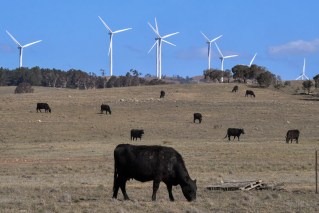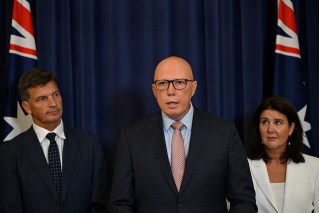Antoinette Lattouf sacking shows damage to ABC by Coalition governments


Antoinette Lattouf (second from left) leaves the Fair Work Commission last week. Photo: AAP
The dispute between the ABC and Antoinette Lattouf, the stand-in radio presenter it recently sacked ostensibly for disobeying a managerial directive, encapsulates several problems that have bedevilled the national broadcaster in recent years.
One is the issue of how to deal with journalistic staff posting on social media about issues in the news. Another is whether it has the backbone to protect its journalists and presenters from external attack. A third is whether the organisation is culturally capable of respecting and supporting staff from diverse backgrounds.
The ABC’s guidelines to all staff on their use of social media come down to this: Don’t use it in ways that damage the ABC’s interests or undermine the individual’s professional capacity.
Journalists and presenters are singled out as “high-risk” staff and there are extra rules for them. The overarching rule is to treat personal content with the “same care as if being published or distributed on an ABC platform”.
Two more instruct journalists and presenters to avoid anything that could be construed as personal approval or support for policies or the actions of public figures. They should also avoid engaging in advocacy on matters of contention.
It is an ethical minefield. It creates dilemmas between journalists’ duty to their employers and their obligation to impartiality on the one hand, and their free-speech rights on the other.
Is it striking the correct balance to require:
- That personal views on personal social media platforms should be treated as if they are being published on an ABC platform
- That journalists and presenters should avoid making judgments about the performance of public figures
- That journalists and presenters should avoid engaging in advocacy on matters of contention?
The last of these is readily resolved. It is inconsistent with a journalist’s obligation to impartiality to engage in advocacy. It turns the journalist into a participant.
This was demonstrated in November 2023, when roughly 300 journalists signed a petition calling for greater scrutiny of the way the Australian media was covering the Gaza war, and in some newsrooms the signatories were banned from covering it.
However, the other two carry the risk of unreasonably oppressing the individual’s free speech unless they are administered with precision and tolerance for reasonable subjective differences. Ethically, the onus for doing so rests on the ABC managers who administer them.
The onus is also on them to demonstrate exactly how, in a particular case, a journalist or presenter’s conduct has harmed the organisation’s interests.
When she was appointed to her temporary ABC job, Lattouf was instructed not to post on “controversial” issues. This is vague and imprecise. It makes no allowance for reasonable subjective differences. It allows “controversial” to mean whatever the ABC decides it means.
And so far, any harm done to the ABC by this matter is self-inflicted.
Before the ABC employed her, Lattouf had made a series of controversial social media posts that, among other things, accused Israeli soldiers of using rape as a weapon of war. Months earlier, she had also been a signatory to the November petition about the media coverage of the war.
After the ABC employed her, she reposted on Instagram a Human Rights Watch report saying Israel was using starvation as a weapon of war.
Tweet from @antoinette_news
According to her statement of claim in the case for unlawful termination she has brought against the ABC in the Fair Work Commission, it was for this that she was sacked.
She is also claiming she was sacked for her political views. Leading up to her sacking, a lobby group called Lawyers for Israel had conducted an intense campaign of WhatsApp messages to the ABC seeking to have her removed and containing the threat of legal action if she was not.
This raises the issues of the ABC’s preparedness to stand up for its staff in the face of external attack, about which the ABC Alumni group has expressed concern.
It also has echoes of the attacks on the former high-profile ABC presenter Stan Grant, particularly by News Corporation, and the failure of the ABC’s senior management to defend him. In resigning from the ABC in 2023, Grant said his trust was broken.
Both the head of news, Justin Stevens, and the managing director, David Anderson, belatedly admitted they should have done more to defend him.
Grant also accused the ABC of being incapable of respecting cultural and racial diversity. Lattouf made the same accusation at the Fair Work Commission, and it was one of the reasons given by an ABC federal politics reporter, Nour Haydar, for her recent resignation.
The ABC has responded to Lattouf by saying her sacking had nothing to do with her race – she is of Lebanese descent – and was all about her breaching a managerial instruction not to post on social media about “controversial” issues.
Anderson has also said the decision to sack her was not influenced by external pressure, although he did not directly refer to the Lawyers for Israel campaign. ABC staff are not convinced and want greater transparency around the complaints process.
Nor has there been an explanation from the ABC about why the posting by Lattouf of the Human Rights Watch report was regarded as a sackable offence when the ABC had itself twice run stories about it.
What does it say about the state of mind inside the management of the ABC that it was thought reasonable to issue a generalised blanket instruction to a presenter to not post anything “controversial” on social media?
It suggests one panicked by the prospect that somebody somewhere might take offence at something somebody at the ABC might post on a controversial matter.
It suggests a state of mind induced by two decades of cumulative intimidation, hostility, board-stacking and financial punishment inflicted on the ABC by successive Liberal-National federal governments.
Of course, the history of the ABC is littered with rows between itself and governments of all stripes, but these were generally episodic and focused on a single cause.
What was seen between 1996 and 2022, except for the period 2007-2013 when Labor was in office, was not episodic. It was systematic, sustained and ideological. The consequences are now being laid bare.![]()
Denis Muller, Senior Research Fellow, Centre for Advancing Journalism, The University of Melbourne
This article is republished from The Conversation under a Creative Commons licence. Read the original article.








